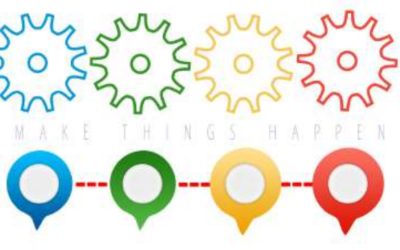“The meanings of words in general usage are often very different from their mathematical meanings.” — Marilyn Burns Educational leaders are becoming increasingly aware of the importance of teaching the language of math in order to raise understanding and performance. There can be extensive reading and writing demands associated with math learning and dyslexic students may be at particular disadvantages learning because they may have trouble reading word problems, dual tasking (listening while taking notes), and confusion with symbols. A paper by Riccomini and colleagues recalled some of the difficulties associated with learning the language of math: – Words that have different meanings in contexts (a foot = 12 inches vs. foot of the bed) – Homonyms (pie vs. pi) – Concepts that may be […]
Managing Too Much Information in Math with Card Sorts and Categories [Premium]
Too often math classes start off with a lot of math problem-solving that can result in students in getting lost. Sometimes the problem is that math explanations overload working memory; other times, students struggle because they can’t listen for understanding at the same time they are trying to take notes, leaving them to figure out what was being taught in math after they get home. THE SEA OF MATH PROBLEMS Often students may find themselves in a sea of math problems. They may have followed the reasoning when concepts were first introduced, but quickly find themselves drowning in dozens and dozens of problems that confuse them in terms of the different ways they are solved. CARD SORTS FOR MATH EXAMPLES AND NEW VOCABULARY […]
How to Not Go Crazy from Fractions and Decimals [Premium]
Fractions and decimals can drive a lot of us crazy. After learning “big” or “long numbers” are larger, suddenly fractions and decimals come along to flip these assumptions upside-down. For dyslexic students, care must be taken at the first step of understanding the equivalences among the different representations of fractions and decimals before moving onto calculations. WHY STUDENTS MAY STRUGGLE WITH FRACTIONS AND DECIMALS Creative Maths has a nice summary of why decimals are so difficult. An excerpt: “Without zero, 2001 and 201 and 21 would all look the same! From early on we recognize that longer numbers represent larger quantities. We know that a salary with lots of zeroes is better than one with only a few. $1000000 is more than $200 even […]
Mind Mapping Math
Fractions can be confusing. Some students are confused by the new terminology that comes with fractions (numerator, denominator), while others are confused because they seem to have different principles from those learned from whole numbers. Numbers that "get bigger"...
Working through Higher Math [Premium]
“An algebra equation should have a physical meaning to it, and have good real world examples…” — Gary McGregor, PhD Gary McGregor has a lot to say when it comes to math because he survived dropping out of high school, knowing only the basics of math calculation (adding and subtracting, but not fractions) before he enrolled in Junior College determined to learn all the math he would need to become a mechanical engineer. Not only did he succeed in that goal, but he also became an expert higher mathematician and now publishes papers involving complex math. So how did he get from A to Z? MATH FROM MULTIPLE PERSPECTIVES Gary was fortunate to learn from a math teacher in junior college who […]
Math Strategies Instead of Drill [Premium]
In the many years Brock and I spent testing and listening to dyslexic students at every level of education, we often heard first hand accounts of how they learned how to tackle difficult subjects and bypass school-related challenges. As research studies bear out (for instance, see Kirby’s study of dyslexic university students), many dyslexic students in higher education have arrived at where they are because they are deep learners, savvy about how they learn best, and strategic in how they approach school. Brain-Based Reasons Why Math Strategies Are Better for Dyslexics Than Drill But there is also neurobiological evidence that supports why strategies may be a superior route for dyslexic learning compared to drill or simple repetition. By now, anyone who knows about brain […]
Math Distance Learning for Students with Dyslexia
Here are several desirable features for remote math programs for dyslexic students: - Comprehensive (math builds on prior knowledge; programs must be comprehensive) - Spiralling (reviews and deepens knowledge of concepts over time; more info here) - Video and...
Higher Math for Scientists: Don’t Give Up [Premium]
“…To be a successful scientist, you need to do what you like to do. If you don’t like mathematics, don’t give up. That doesn’t forestall you’re being a scientist at all.” — E.O. Wilson One of the first science professors I had as a freshman at Harvard was E.O. Wilson, a pioneer of Evolutionary Biology, and scientific giant. I would only learn years later that he was also dyslexic, struggled with math, and was blind in one eye due to a childhood injury. He passed away in December at the age of 92, and left a legacy of insights on the natural sciences and the education of young scientists. One bit of advice that drew him into controversy was his strong insistence that “being […]
MATH: Learning Through Examples, Not Repetition and Drill [Premium]
“… children with dyslexia, because of disruption to left hemisphere language area, use a less optimal route for retrieval-base arithmetic, engaging right hemisphere parietal regions typically used by good readers for procedural-based arithmetic.” — Evans et al, 2014 TEACH MATH TO DYSLEXIC STUDENTS THROUGH STRENGTHS It was a research group at Georgetown University that first made the observations that a group of school age dyslexic students used a different brain strategy when doing single digit arithmetic. As it turns out, an area of the brain (left angular gyrus) implicated in some of reading difficulties associated with dyslexia is also the area of the brain that processes math learning through drill in non-dyslexic kids. So math drill may be the exactly wrong way to teach […]
Getting a Sense for Numbers [Premium]
For many, math is a somewhat mysterious subject. From an early age, some students may stand out from others in their mathematical ability whereas others don’t and some may seem to have bewildering difficulty with even basic aspects of numbers and math quantity. The last decade has seen significant advances in our understanding of individual learning differences when it comes to math. If you are a teacher, tutor, or parent working with a student with math challenges, understanding the basic extent of the difficulty will help guide you about knowing how to help. POOR NUMBER SENSE Poor number sense is a problem noticed at the very start when children begin working with numbers and quantities. A student may memorize how to count (“1,2,3,4…”), but […]
Dyslexic Mathematicians: Paradoxes and Insights [Premium]
“The life narratives of these research mathematicians describe a non-direct pathway to becoming a research mathematician. They describe barriers that could have limited their process, such as calculus focused on memorization, or classes such as organic chemistry focused on memorization. All participants noted that they moved forward in mathematics once they reached a place in which they were fascinated by the problems, most often, a visual-spatial set of problems to solve.” – Lambert and Harriss, 2020 I recently had the pleasure of talking to Dr. Rachel Lambert at the University of Santa Barbara. Her paper with dyslexic mathematician Dr. Edmund Harriss begins with the following bold abstract: “Using neurodiversity as our theoretical framework, rather than a deficit or medical model, we analyze the narratives […]
Dyslexia and Dyscalculia
How often do individuals with dyslexia also have dyscalculia, a specific disability in math? As many as 30-70% of dyslexic students may also be dyscalculic, but math difficulties are rarely tested for in schools, so specific needs for a particular student are rarely...

![The Language of Math [Premium]](https://www.dyslexicadvantage.org/wp-content/uploads/2022/10/The-Language-of-Math-Dyslexic-Advantage.jpg)
![Managing Too Much Information in Math with Card Sorts and Categories [Premium]](https://www.dyslexicadvantage.org/wp-content/uploads/2022/06/math-dyslexia-shutterstock.png)
![How to Not Go Crazy from Fractions and Decimals [Premium]](https://www.dyslexicadvantage.org/wp-content/uploads/2022/05/math-dyslexia-decimals-fractions-400x250.png)

![Working through Higher Math [Premium]](https://www.dyslexicadvantage.org/wp-content/uploads/2022/04/Working-through-Higher-Math-400x250.png)
![Math Strategies Instead of Drill [Premium]](https://www.dyslexicadvantage.org/wp-content/uploads/2022/03/Math-Strategies-Instead-of-Drill-DA-Premium-March-2022-2-e1648381776105-400x250.png)

![Higher Math for Scientists: Don’t Give Up [Premium]](https://www.dyslexicadvantage.org/wp-content/uploads/2022/02/Higher-Math-for-Scientists-2-400x250.jpg)
![MATH: Learning Through Examples, Not Repetition and Drill [Premium]](https://www.dyslexicadvantage.org/wp-content/uploads/2022/01/Learning-through-Examples-4-400x250.png)
![Getting a Sense for Numbers [Premium]](https://www.dyslexicadvantage.org/wp-content/uploads/2021/12/Sense-for-numbers-e1642618957111-400x250.jpg)
![Dyslexic Mathematicians: Paradoxes and Insights [Premium]](https://www.dyslexicadvantage.org/wp-content/uploads/2021/12/Dyslexic-Mathematicians-Paradoxes-and-Insights-5-400x250.png)














